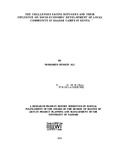| dc.description.abstract | The purpose of this study was to investigate the socio-economic impact of refugees' presence in Daadab Camps, Garissa District, North Eastern province. This research proposal looks at the challenges faced by refugees, their socio- economic activities and intervention measures by the host state, Nongovernmental Organization and aid agencies. Stratified random sampling was used to select respondents who gave information concerning refugees' presence in Dadaab camps and their socio-economic lives. Two instruments were used to collect data, which include a research developed questionnaire for business man and refugees and an interview schedule for NGOs senior officers and security officers.
The research sampled 60 refugees, 3 NGO senior officers, and 12 camp security officers from 3 camps. The researcher obtained a permit from the Ministry of Education headquarters and the Ministry of Home Affairs to authorize him to collect data from the area in,question. Descriptive statistics was used to analyze the data information from the field were put in frequency table, and analyzed in percentages; Analyzed data was presented by use of tables and bar graphs. It is hoped that the findings of this study enabled the relevant stakeholders to improve the socio-economic status of refugees in refugee camps.
The analysis of their responses revealed a certain degree of improvement of refugees in Dadaab camps. The respondents expressed their problems or challenges they face in camps: From the findings of the study .the researcher concludes that the problem faced by refuges these were inadequate supply of food, insecurity, sanitation problems, lack of water, congestion, diseases, lack of incomes, shelter problems, scarcity of food, scarcity of water, scarcity of firewood and restricted movement while doing business.
The researcher also concludes that the major challenges faced by refugees were; Kenyan government by denying them pass, high population .negligence from the agencies concerned, over population, idleness, lack of income, lack of resources and poor sanitation, movement restrictions by not buying anything outsides the camps, price fluctuations, lack of capital to run the business, competition amongst themselves, high supply of certain goods thus lowering their demand, lack of microfinance's, lack of loans, poor infrastructure and poor market. | en_US |

